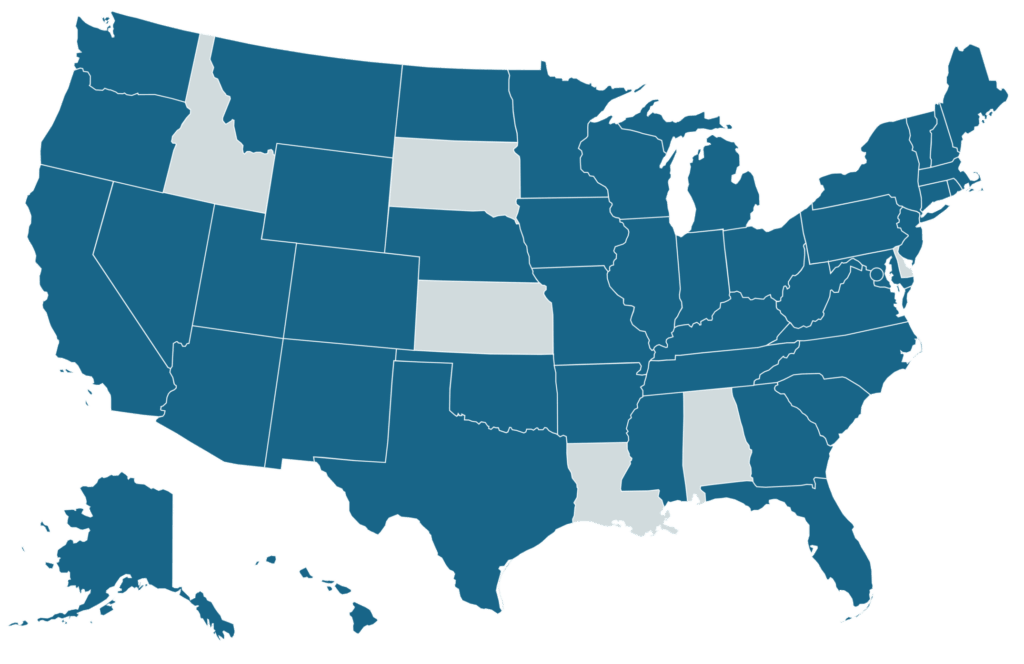
Policy Update
Get Outdoors Day 2025: States Continue to Expand Outdoor Access and Equity
June 12, 2025
In celebration of National Get Outdoors Day, NCEL is highlighting state-led efforts in 2025 to enhance access to the outdoors and human connections to nature.
Overview
In 2025, states across the country have reaffirmed their commitment to making outdoor spaces accessible and equitable. As of June, legislators introduced at least 285 outdoor engagement bills in 45 states and territories, with that number likely to exceed 300 bills by the end of legislative sessions.
Outdoor policy remains one of the most bipartisan areas of state action. There’s strong support across party lines for connecting more people to nature so that everyone can enjoy the many recreation and health benefits that getting outside provides. The continued momentum on outdoor policy in 2025 is notable as it comes despite many states facing divided legislatures, budget years, and ongoing uncertainty around federal resources.
Why Outdoor Engagement Matters
Outdoor recreation and time in nature provide significant health benefits, foster environmental stewardship, and support local economic and community development. The wide-ranging benefits of outdoor engagement present a unique opportunity to serve diverse constituencies and enact bipartisan policies. However, the benefits of nature are not equally distributed. That’s why more states are working to ensure nature access is equitable and available for all communities.
- The Nature Gap: People of color and low-income communities disproportionately live in nature-deprived areas, while many outdoor recreation areas create accessibility issues for the 13% of Americans with disabilities.
- The Benefits of Expanding Outdoor Access: Research shows that underserved communities may experience the greatest benefits from outdoor access – potentially mitigating health disparities in low-income communities, offering especially significant benefits for communities of color, and improving quality of life for people with disabilities. Making the outdoors more accessible also grows the outdoor economy by welcoming new recreators, addressing the skilled worker gap, and offering sustainable economic alternatives to extractive industries.
The 2025 State of Play: Which States Are Moving Outdoors Bills?
Among the 45 states and territories that introduced outdoor engagement policies in 2025, the policy areas that saw the most significant progress include (1) outdoor education, (2) disability access, (3) trail connectivity, and (4) outdoor recreation funding. As of June 2025, at least 23 states have enacted bills into law.

Outdoor Education
Lawmakers have built on growing support for outdoor learning by establishing statewide programs, pilot initiatives, and curriculum pathways that recognize the value of outdoor education. Georgia, Maine, and Nevada are among the at least 17 states that explored this type of legislation in 2025.
View 2025 Legislation
- **Georgia S.B.148 establishes an outdoor education pilot program to develop statewide recommendations on outdoor education school facilities and curriculum.
- **Maine L.D.895 (Enacted) establishes an Outdoor School for All program to provide immersive outdoor education for students in grades four through eight.
- **Maine L.D.550 establishes an experiential education program aimed at enhancing outdoor, agricultural-based, and hands-on experiential learning in public schools with the assistance of the Department of Agriculture, Conservation, and Forestry.
- **Nevada A.B.165 establishes the Outdoor Education Council to promote and support outdoor education through awarding designations to schools and teachers, providing training, and identifying funding sources.
- Nevada A.B.501 (Enacted) allows students to earn elective credits for approved outdoor recreational activities such as identifying native plants and animals, building trails, restoring habitats, and learning outdoor survival and recreational skills.
**Indicates bipartisan sponsorship
Disability Access in the Outdoors
States have advanced inclusive outdoor policies to ensure more people with disabilities can participate in outdoor recreation opportunities. California, Hawaii, Massachusetts, Montana, New Jersey, New York, and Utah considered this type of legislation in 2025.
View 2025 Legislation
- California A.B.1225 establishes an Accessibility Advisory Committee to advise on improving disability access in state parks.
- Montana S.B.238 (Enacted) establishes a program funded by optional donations on hunting licenses that supports bowhunters with disabilities by helping nonprofits acquire modified archery equipment.
- New York A.4489 requires all state parks with playgrounds to include handicap-accessible swing sets for children with disabilities by 2027.
**Indicates bipartisan sponsorship
Trail Access and Connectivity
Over 20 states moved to expand trail networks and improve public transit access to outdoor areas. These states include Montana, Nevada, Texas, and Vermont.
View 2025 Legislation
- Montana S.B.310 (Enacted) revises the Trails and Recreational Facilities Grant Program by establishing the Trail Stewardship Grant Program to allow funding for trail-related studies, education, and data collection.
- **Nevada S.B.405 (Enacted) creates the Transit-to-Trails Task Force to improve public transit access to outdoor recreation areas.
- **Texas H.B.4230 establishes the Bicentennial Trail, a network of hike and bike trails connecting significant historic and cultural sites as well as existing trails to promote outdoor recreation, environmental stewardship, and the state’s historical and cultural heritage.
- **Vermont H.488 (Enacted) defines rail trails and their uses and appropriates nearly $22 million for bike and pedestrian path and trail improvements.
**Indicates bipartisan sponsorship
Outdoor Recreation Funding
With tightening state budgets and uncertainty at the federal level, lawmakers reallocated funds and introduced new revenue sources to support outdoor recreation infrastructure. Such states include Colorado, Hawaii, Utah, and Vermont.
View 2025 Legislation
- **Colorado H.B.25-1215 (Enacted) reallocates Colorado Lottery Fund distributions to increase funding for the Outdoor Equity Fund and Public School Capital Construction Assistance Fund.
- **Colorado H.B.25-1061 (Enacted) establishes a $4 million grant program, funded by the Local Government Severance Tax Fund, to develop community schoolyards, prioritizing underserved areas.
- Hawaii S.B.439 establishes user fees specifically for nonresidents visiting state parks and trails, with proceeds funding conservation and recreation maintenance.
- Utah H.B.115 (Enacted) allows the State Park Fees Account to retain interest earnings, gradually increasing the percentage of interest retained over three years.
- Vermont S.122 appropriates $250,000 to the Department of Forests, Parks, and Recreation to provide outdoor businesses with technical assistance, workshops, consultation, and other resources to promote a circular, climate-stable outdoor economy.
**Indicates bipartisan sponsorship
Other Notable Bills
States also continued efforts to support offices of outdoor recreation, Tribal access to public lands, and economic development related to the outdoor economy. Bills from Arkansas, Colorado, and Indiana serve as notable examples.
View 2025 Legislation
- Arkansas H.B.1607 (Enacted) permanently establishes the existing Office of Outdoor Recreation in state law.
- **Colorado H.B.25-1163 (Enacted) allows enrolled members of the Southern Ute Indian Tribe and enrolled members of the Ute Mountain Ute Tribe to enter state parks without having to pay an entrance fee.
- **Indiana H.B.1616 (Enacted) urges a study on the economic value and impacts of public recreational lands.
**Indicates bipartisan sponsorship
Looking Ahead: Stay Informed on Outdoor Policy
The persistent growth of outdoor engagement policy is a testament to its broad appeal and diverse benefits. States are not only expanding access to trails and parks – they’re also investing in the next generation of environmental stewards through education, equity, and innovation.
Stay up to date on trends in outdoor engagement policy across the country this year with NCEL’s Bill Tracking Map.